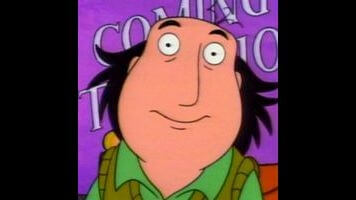The Critic: “Marty’s First Date”

If the creators of The Critic had had their way, the show would have followed up a pilot where protagonist Jay Sherman is faced with a moral conundrum when called upon to review the film of a gorgeous actress he’s sleeping with an episode where Jay Sherman is menaced by a psychotic female fan in an extended Misery parody. It would have been an extraordinarily dark and unmistakably adult follow-up for a show still courting The Simpsons’ family audience.
Cooler, more cautious heads prevailed and “Pilot” was followed by the more family-friendly “Marty’s First Date.” The show still seemingly made some pretty perverse choices when it came to courting a mass audience, however. “Marty’s First Date”, for example, introduces Jay’s angry shrew of an ex-wife shivering with seemingly justified revulsion as she looks at Jay from angles that make him look both repulsive and disconcertingly phallic and has old wallpaper torn down because, as she bitterly recounts, it has “too many bad memories.” The show seemingly couldn’t take a step forward commercially with shimmying a few steps back.
Jay’s cozy relationship with his son is one of the show’s more commercial aspects, but even the character of Marty reflects the show’s continental bent and metropolitan sensibility. Many of the jokes involving Marty, for example, involve his schooling at the United Nations Private School (motto: “Teaching Brotherhood and Tolerance Who Those Who Can Afford It”) Nothing ropes in kids quite like jokes about international relations and the Easter Islands.
Thankfully, puppy love is a safer bet so “Marty’s First Date” finds an appropriately international choice for Marty’s first date/love: Fidel Castro’s bookish granddaughter Carmen. “Marty’s First Date” borrows its premise from two of the preeminent classics of the field: Cyrano De Bergerac and Romeo & Juliet.
First, Jay volunteers to coach his son of the ways of love despite his own comitragic romantic history. The Critic has a remarkably jaundiced, cynical view on love. There is, of course, the cautionary warning that is Jay’s toxic relationship with his ex-wife (who we learn here apparently committed to marrying him without ever seeing his face or hearing his voice) but the parade of failure and humiliation doesn’t end there. Is it any wonder Jay desperately tells his son of the fairer sex, “Once they’ve got their claws in you there’s no end to the horrors they can inflict. Don’t leave your papa! Don’t leave your papa!?”
“Marty’s First Date” shifts from Cyrano De Bergerac to Romeo & Juliet once Carmen’s parents send her back home to Cuba to keep her from pursuing her relationship with Marty any further. In its third act, “Marty’s First Date” combines good-natured jabs at Cuban anti-Americanism with light romance as Marty pursues his evasive love across national lines.
There’s an astonishing range of jokes on The Critic. There are the bite-sized movie parodies and gags about Jay’s weight, love life and career but also weird conceptual bits and jokes that almost feel like the television equivalent of a head-scratcher of a New Yorker cartoon, like an odd gag where a bum takes a cello out of a garbage can, plays a few lovely notes and collects cash from indulgent strangers who angrily take back their money the moment he hits a wrong note. It’s not a particularly funny gag but it’s the kind of genial, New Yorkcentric joke that gives the show its character.
There are a fair number of hacky jokes as well. A mock trailer for F—an X-style biography of half-forgotten Republican also-ran Malcolm Forbes—indelibly dates the episode as a product of 1994 and gags involving Sally Struthers and Woody Allen cry out for a rim shot. To both its credit and its detriment, The Critic doesn’t discriminate between jokes. It has a vaudevillian lack of shame about trolling deep depths for a laugh (or at least a knowing chuckle).
What ultimately sells “Marty’s First Date” are not the Hellzapoppin-style gags or broad political satire but rather the underlying sweetness of the relationships between Jay and Marty and Marty and Carmen. Marty clearly adores his father and the feeling is mutual. By the time Carmen and Marty share a kiss that takes them from day to night and sends fireworks rocketing in the distance the show's cynicism has given way to swooning, infectious romanticism.







































